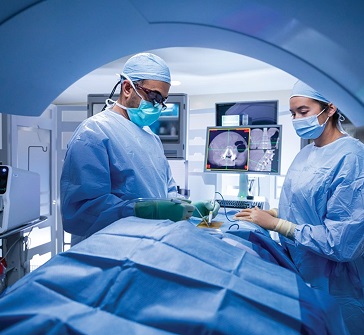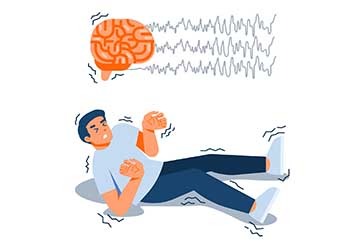 Book Appt.
Book Appt.
 Call Now
Call Now


Neurocutaneous syndromes are a group of genetic disorders characterized by abnormalities in the skin, nervous system, or both. These conditions are primarily congenital, resulting from mutations in specific genes during early embryonic development. Notable neurocutaneous syndromes include Neurofibromatosis Type 1 (NF1), Neurofibromatosis Type 2 (NF2), Tuberous Sclerosis Complex (TSC), and Sturge-Weber Syndrome (SWS).
NF1, also known as von Recklinghausen disease, arises from mutations in the NF1 gene. This tumor suppressor gene encodes neurofibromin, a protein crucial in regulating cell growth. Clinical manifestations include café-au-lait spots, neurofibromas, and optic nerve gliomas. Furthermore, NF1 predisposes individuals to various tumors, including pheochromocytomas and malignant peripheral nerve sheath tumors.
Caused by mutations in the NF2 gene, NF2 primarily leads to the development of vestibular schwannomas, benign tumors of the eighth cranial nerve. Individuals with NF2 may also exhibit meningiomas, ependymomas, and spinal schwannomas. Early diagnosis and treatment are essential for preserving hearing and preventing complications associated with tumor growth.
TSC is a multisystem disorder linked to mutations in either the TSC1 or TSC2 genes. These genes regulate the mTOR signaling pathway, which controls cell growth and proliferation. Dermatologic manifestations, such as facial angiofibromas and shagreen patches, are hallmark signs. Additionally, TSC leads to the formation of cortical tubers in the brain, causing epilepsy and cognitive impairment.
SWS is characterized by port-wine stain birthmarks on the face and head, resulting from capillary malformations. These vascular abnormalities extend to the brain, leading to leptomeningeal angiomas and potential neurological complications. Seizures and neurological deficits are common, highlighting the importance of early diagnosis and intervention.
Managing neurocutaneous syndromes necessitates a multidisciplinary approach. Genetic counseling is imperative for families affected by these conditions, providing insight into inheritance patterns and family planning options. Regular clinical evaluations, including dermatologic, ophthalmologic, and neurologic assessments, are crucial for monitoring disease progression and detecting potential complications.
Treatment modalities vary based on the specific neurocutaneous syndrome and associated manifestations. Surgical resection may be required for symptomatic tumors, while pharmacotherapy, such as mTOR inhibitors for TSC, can help manage disease-related symptoms. Additionally, ongoing research into targeted therapies and gene-based interventions offers promising avenues for future treatments.
Advancements in genomic technologies and molecular biology continue to shed light on the intricate genetic underpinnings of neurocutaneous syndromes. Ongoing research aims to identify novel therapeutic targets and refine diagnostic approaches, ultimately improving outcomes for individuals affected by these conditions.
In conclusion, neurocutaneous syndromes represent a diverse group of disorders with complex genetic origins. Understanding the underlying molecular mechanisms, recognizing clinical manifestations, and implementing a multidisciplinary approach to management are critical in providing optimal care for individuals affected by these conditions. Ongoing research holds the promise of further elucidating these syndromes and developing innovative therapeutic strategies.
SHALBY Sanar International Hospitals provides extensive medical procedures backed up with our state-of-the-art technology and a team of highly qualified & experienced clinical experts.

Patient from Iraq gets treated by Dr. Harnarayan Singh | SHALBY Sanar International Hospitals

15 year old Patient from Liberia gets treated by Dr Harnarayan Singh | Neurosurgery & Spine Surgery

Mrs. Khalida Khaleel from Iraq Overcomes Degenerative Disc & Grade 1 Spondylolisthesis

Successful Treatment of a Patient from Uzbekistan for Degenerative Disc Disease and Back Syndrome

Surviving Stroke: Bipasha Banerjee's Testimony on Timely Intervention

Successful Intraoperation Neuro Monitoring on patient Hasan from Iraq

Successful removal of Glioma using advanced machines

A multidisciplinary care worked wonders for Ms. Akhtamova from Tajikistan

Treatment for Brain Aneurysm - Al Qumairi Saeed Mohsen Awadh from Yemen
Our doctors pen down their research findings and experiences from time to time. Their words provide deep insight into the latest techniques, technologies and other advancements in healthcare. It provides expert answers to all kinds of health questions for real-life issues.
VIEW ALL




Since the day of its foundation, SHALBY Sanar International Hospitals is committed to provide comprehensive healthcare services. It regularly organizes awareness programs in its premises and encourages outdoor healthcare activities and camps with an intent to put focus on preventive healthcare.
VIEW ALL